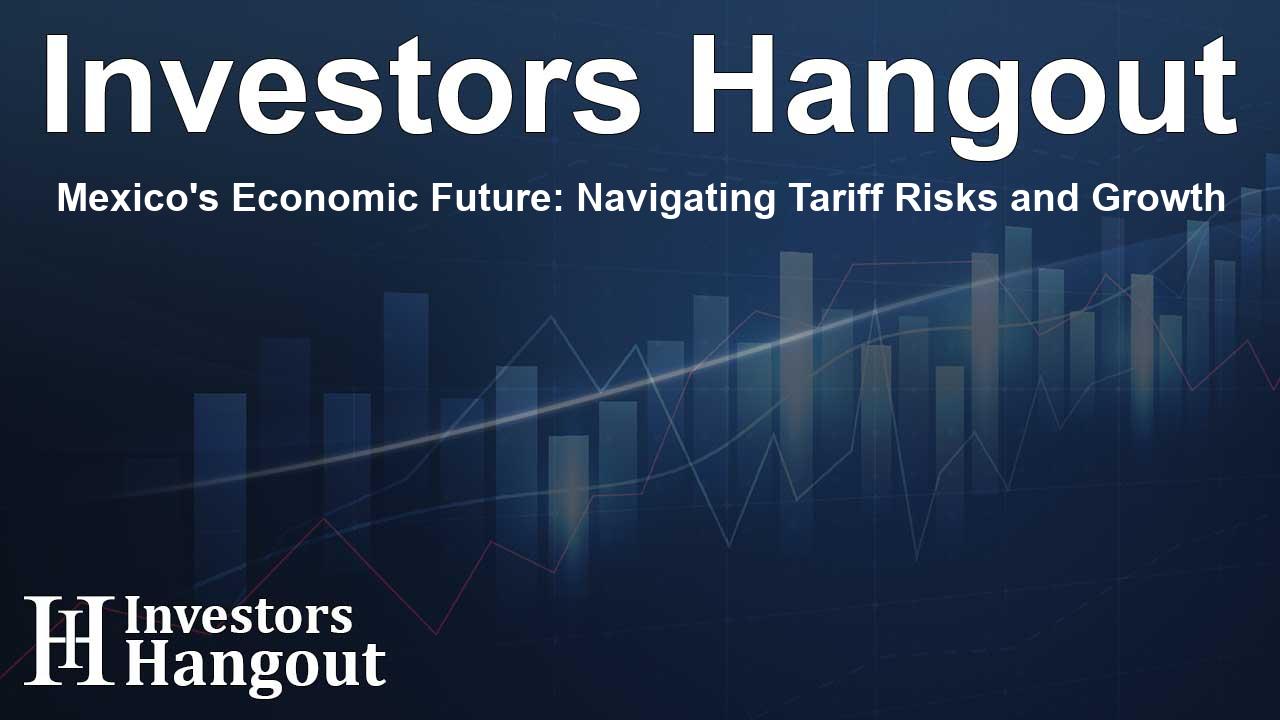Mexico's Economic Future: Navigating Tariff Risks and Growth

Understanding Mexico's Economic Landscape Amid Uncertain Times
By Gabriel Burin
Mexico's economy stands at a crossroads, showcasing a sluggish growth outlook as economists weigh the impact of potential U.S. tariff changes and uncertain migration policies. The challenges faced by the country, which ranks as Latin America's second-largest economy, underscore the need for strategic responses to external pressures.
Current Economic Forecasts and Industry Implications
According to a recent Reuters poll, Mexico's economy is anticipated to grow by a modest 1.2% in the coming year. This figure reflects a decrease from the previous year's growth of 1.6%. Such predictions reveal the caution shared among economists, driven primarily by consumer sentiment, export performance issues, and a decline in fixed investments.
Private sector spending remains fragile, primarily influenced by a climate of high uncertainty and elevated interest rates. Nevertheless, the government is exploring measures aimed at supporting low-wage earners and targeting key industrial sectors to stimulate growth.
Political Context and Its Economic Ramifications
The economic climate is being further complicated by the impending inauguration of the U.S. President-elect, alongside debates over the imposition of up to 25% tariffs on imports from Mexico. The uncertainty involved in U.S.-Mexico relations creates significant apprehension within the financial and investment communities.
In light of these developments, Mexico's current administration is demonstrating proactive measures to avert possible tariff implementations. Steps include focusing on managing illegal migration and drug trafficking concerns, which are seen as critical to alleviating U.S. apprehensions.
The Role of Nearshoring and Investment Considerations
Although nearshoring presents a long-term opportunity for Mexico, the political landscape and investor uncertainties threaten to delay the anticipated capital inflows necessary for economic recovery. The lingering questions regarding trade and investment policies could hinder Mexico's competitiveness within the North American market.
Pamela Diaz Loubet, a Mexican economist at BNP Paribas, emphasizes the weight of reduced private consumption, a weaker export market, and diminishing investment as significant hurdles to economic progress. These factors, intertwined with the broader legislative agenda, contribute to the complex economic picture.
Interest Rate Adjustments and Monetary Policy
In response to these economic dynamics, the Bank of Mexico (Banxico) has already reduced its benchmark interest rate to 10%, down from an all-time high of 11.25%. Economists forecast a further reduction of about 150 basis points by the end of 2025, although this trajectory depends significantly on external pressures such as new tariffs.
A recent survey indicated that the majority of the economists polled believe Banxico should maintain its current monetary easing approach, despite the looming tariffs. A minority proposed a more cautious outlook, suggesting rate reductions might be more limited than anticipated.
Implications of Potential Tariff Increases
The ramifications of enhanced tariffs could impede growth for the Mexican economy, even as Banxico navigates its monetary policy. Respondents in the poll suggest that while higher tariffs present challenges, the central bank is likely to maintain a conservative policy instead of pursuing aggressive cuts.
Alberto Ramos from Goldman Sachs noted that rapid changes to monetary policy might provoke undesired market reactions, necessitating a more tempered approach to financial conditions.
A Look Beyond: The Future of Mexico's Economy
Amid these challenges, Mexico's future economic landscape will depend largely on how effectively the government can manage relations with the United States and the broader global market. Building robust strategies to ensure resilience and adaptability amid fluctuating tariff policies could provide a pathway for Mexico to bolster its economic standing.
Frequently Asked Questions
What are the main factors affecting Mexico's economic growth?
Factors like reduced private consumption, weaker export performance, and declining investments influenced by political uncertainty are critical hurdles.
How is Mexico responding to potential U.S. tariffs?
The Mexican government is focusing on addressing migration and drug trafficking issues to mitigate U.S. concerns and avert tariffs.
What is the projected GDP growth for Mexico?
Experts forecast a modest GDP growth of 1.2% for Mexico, down from 1.6% last year.
What role does Banxico play in Mexico's economy?
Banxico manages monetary policy, including interest rates, to combat economic challenges and stabilize the economy.
How might nearshoring impact Mexico's economy?
Nearshoring could offer long-term growth opportunities, especially in manufacturing and exports, if political uncertainties are resolved.
About The Author
Contact Thomas Cooper privately here. Or send an email with ATTN: Thomas Cooper as the subject to contact@investorshangout.com.
About Investors Hangout
Investors Hangout is a leading online stock forum for financial discussion and learning, offering a wide range of free tools and resources. It draws in traders of all levels, who exchange market knowledge, investigate trading tactics, and keep an eye on industry developments in real time. Featuring financial articles, stock message boards, quotes, charts, company profiles, and live news updates. Through cooperative learning and a wealth of informational resources, it helps users from novices creating their first portfolios to experts honing their techniques. Join Investors Hangout today: https://investorshangout.com/
The content of this article is based on factual, publicly available information and does not represent legal, financial, or investment advice. Investors Hangout does not offer financial advice, and the author is not a licensed financial advisor. Consult a qualified advisor before making any financial or investment decisions based on this article. This article should not be considered advice to purchase, sell, or hold any securities or other investments. If any of the material provided here is inaccurate, please contact us for corrections.
